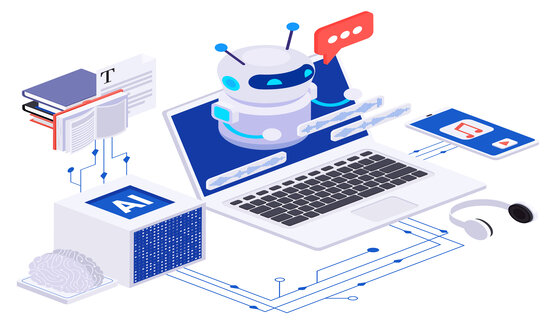Navigating Through the Emerging Realm of Machine Learning
As the technological landscape is evolving every day, Machine learning (ML) has now become more important than ever.
As the technological landscape upgrades daily, Machine Learning (ML) is now more important than ever. As it helps handle large amounts of data and derive useful insights, it is now used for various tasks in healthcare, finance, e-commerce, customer care, and many other fields. Resultantly, the demand for ML professionals is surging.
A high demand in the market makes it an enticing career path. However, transitioning into a machine learning career, especially from a non-technical field, can seem intimidating. Fear not, as it’s entirely possible to bridge this gap. The journey requires dedication, consistent learning, and a strategic approach. Let’s delve into how you can make a smooth transition into a machine learning career.
Understanding the Basics
Machine learning includes both; having the knowledge of algorithms and the practical skills to implement them.
An ML expert must understand how machines are programmed to identify data patterns, find relationships between different things, and make decisions without human intervention. And besides learning “how,” it is also important to learn “when” to use different algorithms.
With ML, you understand that regression models do well for predicting numerical values, and classification models are best for categorical conclusions.
This understanding of the basic concepts will provide a strong platform for your transition into machine learning.
Investing in Relevant Education
Learning machine learning through a proper educational course provides a well-structured approach to the vast field. Choosing the right Machine Learning Course becomes essential as it not only offers a theoretical understanding but also provides hands-on experience with real-world problems. Such courses are designed to cover important algorithms, methods, and principles and allow learners to experiment and learn in a supervised environment.
Solidifying Your Programming Skills
Programming is the language through which we communicate with machines. So, programming knowledge can be rightly called as the backbone of machine learning. Mastery of languages like Python and R are valuable assets because they are designed to handle data analysis tasks efficiently and have extensive libraries tailored specifically for machine learning.
Familiarity with SQL is also beneficial for machine learning, as data extraction and manipulation play a significant role in predicting outcomes.
Learning algorithms and how to implement them becomes a lot easier when you have a high coding proficiency.
Brushing Up Your Math and Statistics
Machine learning algorithms are built upon mathematical and statistical models. Understanding the underlying mathematics will help you grasp how these algorithms learn from data, enabling you to make better-informed choices about which algorithms to use and how to tune them. While learning these concepts, focus on understanding the principles rather than getting lost in complex calculations. Remember, the goal is to apply these principles to machine learning rather than becoming a mathematician.
Gaining Data Handling Skills
As a machine learning professional, much of your time will be spent handling data.
Raw data from real-world situations is unstructured and quite messy as well. So, preprocessing data (i.e., data organization before you can manipulate it) is a crucial step.
Mastering tools like Pandas and NumPy, which help in handling and processing data, can greatly ease your workflow. Moreover, learning to visualize data will allow you to understand the data better and derive meaningful insights, making it a valuable skill in your ML toolkit.
Hands-On Experience
Theoretical knowledge is a necessary foundation, but practical application cements your learning. Working on projects exposes you to the challenges of real-world data and gives you a chance to implement various machine-learning algorithms. Tackling diverse problems will help you learn how to choose appropriate algorithms, tune parameters, and evaluate models, thereby enriching your understanding and skills in machine learning.
Staying Updated with the Latest Trends
The field of machine learning is always on the move, with new algorithms, techniques, and applications constantly emerging. Hence, continuing education becomes vital to stay competitive. Following influential ML researchers, attending conferences, and reading relevant research papers can help you stay abreast of the latest advancements.
In today’s digital era, where simplicity and convenience are paramount, the concept of No Code Machine Learning is gaining popularity. These platforms provide intuitive interfaces to build, train, and deploy ML models, reducing the barrier to entry for many aspiring ML enthusiasts.
Networking
Networking is often underestimated but is a powerful tool in your transition journey. Attending industry events, webinars, or workshops can help you connect with other ML professionals, and their experiences and guidance can provide invaluable insights.
Online forums can help you understand different perspectives about the field. Community engagement also exposes you to real problem-solving, which teaches the skill tenfold faster than traditional learning.
Tailoring Your Resume
Your resume is the first impression for potential employers. Therefore, it’s vital to effectively showcase your machine learning skills. Highlighting your education, projects, and transferable skills related to machine learning can make your resume stand out, even if you lack professional experience in the field. Remember, your goal is to demonstrate your potential and readiness to transition into a machine learning career.
Prioritizing Learning Paths
While there’s a plethora of resources available online, it’s essential not to get overwhelmed. Try to stick to one comprehensive resource at a time. A structured Machine Learning Course can prove valuable as it follows a set curriculum and a progressive learning path.
Expanding Your Programming Acumen
As you solidify your programming skills, explore how to effectively use libraries and frameworks that are instrumental in machine learning.
You can use tools from libraries like Scikit-learn, TensorFlow, and Keras to implement ML models. These tools can significantly increase your ML proficiency when you know how to use them properly.
Refining Problem-Solving Skills
Machine learning is essentially about solving complex problems using data. Hence, refining your problem-solving skills is essential. This means being able to understand a problem, identify the suitable ML technique to apply, process and analyze the data, and finally evaluate the model’s performance.
Enhancing Hands-On Experience Through Competitions
Platforms like Kaggle offer data science and machine learning competitions where you can solve real-world problems with real-world data. Participating in such competitions can enhance your hands-on experience, give you exposure to various ML problems, and allow you to learn from the global ML community.
In case the world of coding seems overwhelming, consider exploring No Code Machine Learning tools. These platforms democratize access to ML, allowing enthusiasts from non-programming backgrounds to leverage machine learning’s power.
Conclusion
Transitioning into a machine learning career from a different field is a journey that requires commitment and constant learning. But with the right guidance, consistent effort, and a passion for learning, it is entirely achievable.
ML revolution is still in its initial phases, promising to offer numerous opportunities in the future. So, take the first step today, and navigate your way into a rewarding machine learning career.


